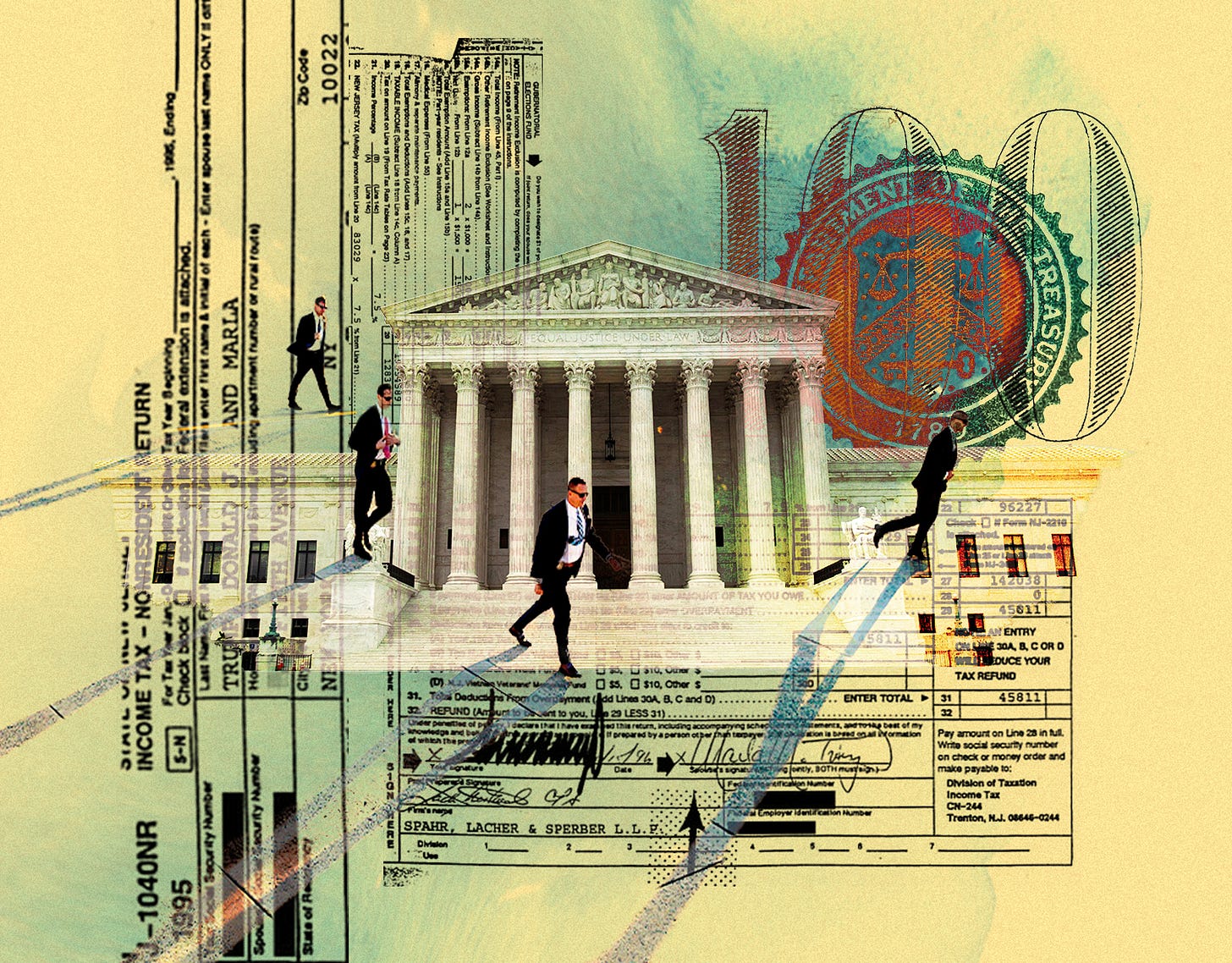Trump’s Tax-Case Loss Is a Victory for the Rule of Law
The Supreme Court rulings helpfully remind us how courts and states can push back against a failing and corrupt president when Congress won’t.
This week’s Supreme Court decision in Trump v. Vance is a reminder that two institutions of government are especially critical for surviving Trumpian chaos and corruption: the states and the courts.
In Vance, the Court decided 7-2 to enforce a grand jury subpoena issued by the New York County District Attorney’s Office on the personal accounting firm of Donald Trump. Recall that internal Department of Justice guidance dating back to the Nixon White House forbids federal prosecutors from indicting sitting presidents, which means that the only criminal accountability for hypothetical presidential felons must come—if at all—from the states. New York County D.A. Cyrus Vance hasn’t shied away from investigating Trump’s excesses, despite the political risks to his elected position. In an interview with the Washington Post last year, he explained: “We have to be able to fill the gaps when the FBI can’t or won’t take these cases.”
In a companion case, Trump v. Mazars, the same majority upheld Congress’s constitutional right to subpoena the same accounting firm and two banks for records, but sent the matter back to the lower court to apply a new standard the Court set forth for testing the propriety of congressional subpoenas. What’s ironic about Mazars is that the Republican-controlled Senate’s acquittal of Donald Trump on the obstruction of Congress impeachment charge greenlighted presidential nose-thumbing at congressional subpoenas going forward. The Supreme Court put that tool back in the congressional toolbox—a gift of the Article III branch of government to an Article I branch that has been shamefully beholden, on balance, to the current bully-in-chief.
So, where the Department of Justice and the Senate majority have refused outright to hold the president accountable for violations of the rule the law, the states and the courts have not. This is a victory for the Constitution and democracy itself in the United States. In establishing a divided government with power lodged in separate sovereigns—the federal government and the states—and by giving federal judges life tenure that enables them to rule on the facts and the law without fear of political retribution, the Constitution’s Framers were certainly onto something.
To understand how critical the states and the courts have become for purposes of protecting the very structure of government by “We the People,” one need only look at the dissenting opinions in Vance, which appear deeply out of touch with the dark realities of the Trump era—almost naïvely so.
Here’s Justice Alito:
The Constitution entrusts the President with responsibilities that are essential to the country’s safety and well- being. The President is Commander in Chief of the Armed Forces. . . . He is responsible for the defense of the country from the moment he enters office until the moment he leaves. . .
The President also has the lead role in foreign relations. . . .
As the head of the Executive Branch, the President is ultimately responsible for everything done by all the departments and agencies of the Federal Government and a federal civilian work force that includes millions of employees. . . .
Without a President who is able at all times to carry out the responsibilities of the office, our constitutional system could not operate, and the country would be at risk. . . .
The Framers . . . entrusted the weighty decision whether to remove a President to a supermajority of Senators, who were expected to exercise reasoned judgment and not the political passions of the day or the sentiments of a particular region. In light of current events, it’s hard to read these words from a Supreme Court justice and keep one’s jaw off of the floor. Trump just pulled out of the World Health Organization in the midst of a global pandemic that has already claimed 134,000 American lives, with 3.1 million confirmed cases and climbing. Not only is there no coherent national response in the United States—unlike across the rest of the world—but Trump has repeatedly worked against epidemiologists and science to pretend that the virus isn’t real and coax his followers to reject basic precautions, like social distancing and wearing masks. As commander-in-chief, he has done nothing about recent reports that his buddy Vladimir Putin paid Taliban militants to murder American soldiers. Instead, for nearly four straight years, he has insulted and alienated our allies and courted our enemies.
Not to put too fine a point on it, but you can’t make this stuff up. Justice Alito is apparently living in an altered state of reality—a very pleasant one in which Trump hasn’t been elected, as if we were living in the pre-Trump years instead of our present dystopia. If the producers of Game of Thrones wanted to make a ninth season, they they would have plenty of material to work with from the real-life Trump White House.
What Alito ignores is that his platonic ideals for the presidency mean nothing without accountability. Whether a president can legally take an action—the “can he do this?” question—boils down to consequences. Rules are good so only as they are enforced. With Trump, the answer to the “can he do this?” question is that it’s the wrong question. The correct question is, when he does that horrible thing, what is the consequence? If there is no consequence, then the answer to the first question is yes. Not because it’s legal, but because nobody is willing to enforce the rule in the breach.
With the Vance and Mazars cases, the Supreme Court reminded the world that there remain a few cops patrolling the Constitution beat that Trump cannot berate into submission: the federal courts and the states. That is something to be hopeful about.



